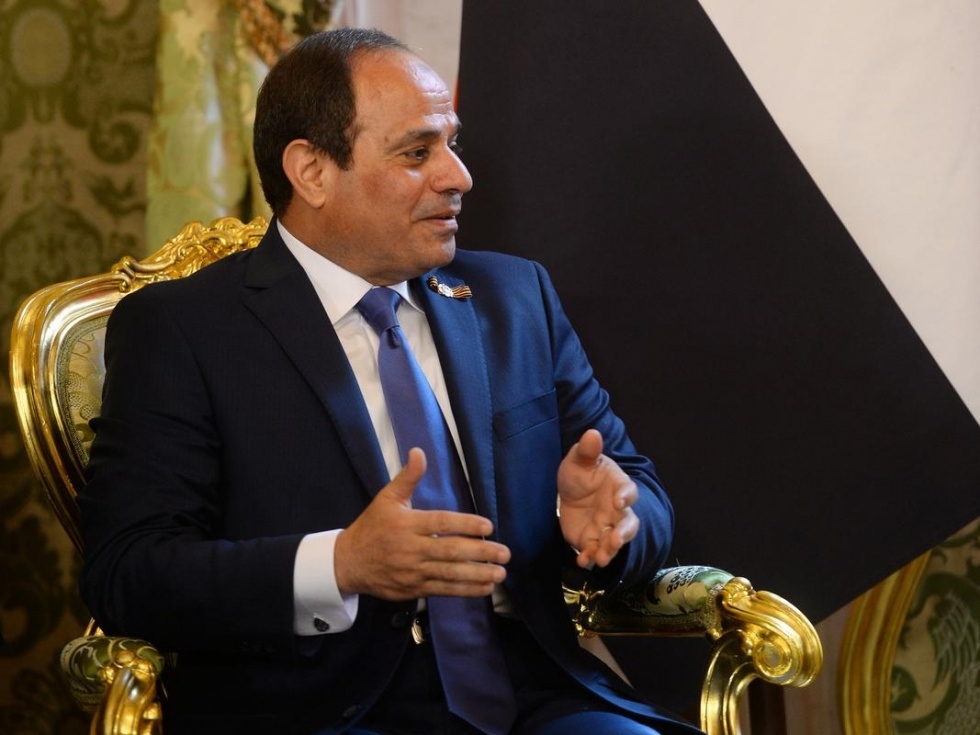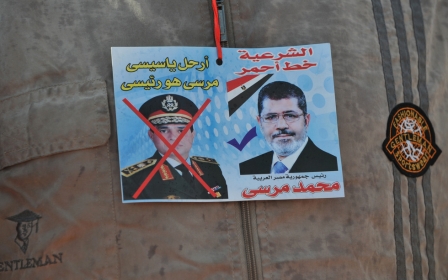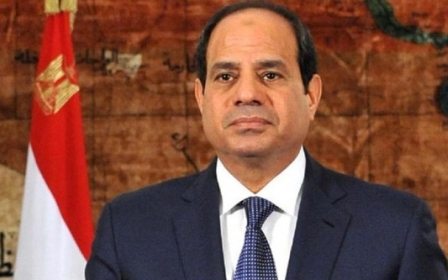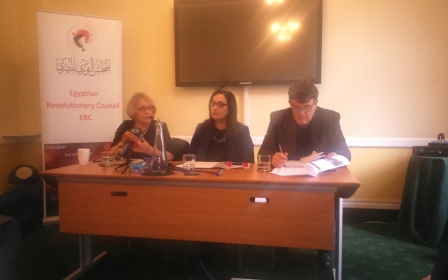UK cancellation of Sharm flights raises tensions ahead of Sisi meeting

Just hours ahead of a scheduled meeting on Thursday between Egyptian and British leaders, a diplomatic spat over the cancellation of British flights out of Sharm al-Sheikh has raised concerns that engagement during Egyptian President Abdel Fattah al-Sisi's visit will be limited between the two countries.
Hundreds of protesters, both in support of and against the Egyptian president, have lined up outside of Downing Street ahead of the meeting on Thursday morning. At least three double-decker buses carrying pro-Sisi protesters have driven down Whitehall and by Westminster while anti-Sisi protesters, laying on the ground to mimic dead bodies, have been carried away by the police, MEE's Nawal Maghafi reports from the scene.
On Wednesday, Britain suspended flights out of the Red Sea resort town as Foreign Secretary Philip Hammond suggested there was a "significant possibility" that a bomb may have brought down a Russian airliner last Saturday. All 224 passengers were killed in the crash.
The decision, made during a Cobra meeting on Wednesday afternoon, was announced as Sisi was thought to be en route to London, Hammond told the BBC on Thursday morning. An estimated 20,000 British holidaymakers are now stranded.
Senior Egyptian diplomats are reportedly said to be frustrated by the decision, saying their country has responded to British requests to secure the airport. As recently as Monday, Sisi told BBC that the Sinai area was "under our full control".
One official told BBC that, as a result of the cancellation, the Egyptian delegation is less likely to be receptive to issues which the British bring up in the discussion on Thursday which were thought to include, in addition to security, concerns about democracy in Egypt.
Egypt's foreign minister, Sameh Shoukry, who is thought to be in London as part of the Egyptian delegation, reportedly said he was very disappointed by the UK government's decision, calling it "a premature and unwarranted statement".
Over the past year, UK officials have repeatedly emphasised the security partnership between Britain and Egypt and, as part of Sisi's trip this week, the first since he led the Egyptian army's overthrow of democratically elected president Mohamed Morsi, it was to be one of the major topics for discussion between the two leaders.
Egyptian authorities have played down the possibility of a bomb attack and stressed the need to wait for the results of an international investigation, keen to preserve the country's economically vital tourism sector.
But US officials said on Wednesday that it was "highly possible" that a bomb brought down the plane.
The British prime minister has faced protests for welcoming Sisi, who has crushed opposition in Egypt and jailed as many as 40,000 people, from Muslim Brotherhood supporters to secularists and leftists.
Critics have accused Cameron of putting security and trade interests with Egypt above human rights. While UK officials have highlighted Sisi as a partner for maintaining security both in Egypt and further afield in North Africa, human rights advocates have questioned whether human rights violations during his tenure have encouraged radicalisation and violence.
Corbyn condemns Sisi visit
The leader of Britain's main Labour opposition party Jeremy Corbyn slammed the visit and British military support for Sisi.
"David Cameron's invitation to Britain of the Egyptian president and coup leader Abdel Fattah al-Sisi shows contempt for human and democratic rights and threatens, rather than protects, Britain's national security," Corbyn said.
"Rather than rolling out the red carpet to President Sisi, the prime minister should suspend arms exports to Egypt until democratic and civil rights are restored," he added.
“Support for dialogue and negotiated conflict resolution in the Middle East is vital to us all. But to welcome and bolster with military support the coup leader who overthrew a democratically elected president in 2013 and has presided over the killing and jailing of many thousands since makes a mockery of government claims to be promoting peace and justice in the region.”
A crowd of 200 people holding banners reading "stop the repression in Egypt" and "Sisi not welcome" protested outside Cameron's office on the eve of the visit, and more demonstrations are planned for Thursday.
"David Cameron, can't you see, Sisi killed democracy?" the protesters chanted, according to a Reuters report.
Some 50 MPs have signed a resolution calling for Sisi's visit to be cancelled, the report added.
"Cameron has shifted priorities from the rules of democracy and human rights to trade and investment," Farouk Messahel, from the Birmingham Egyptians Group, told AFP.
A spokesman for Cameron defended the government's stance, saying it was important to discuss issues of "mutual interest" with Sisi, such as combatting terrorism in Egypt and building stability in Libya.
"The stronger our working relationship, the more able we are to have the necessary and frank discussions about the issues on which we disagree," the spokesman said.
New MEE newsletter: Jerusalem Dispatch
Sign up to get the latest insights and analysis on Israel-Palestine, alongside Turkey Unpacked and other MEE newsletters
Middle East Eye delivers independent and unrivalled coverage and analysis of the Middle East, North Africa and beyond. To learn more about republishing this content and the associated fees, please fill out this form. More about MEE can be found here.




